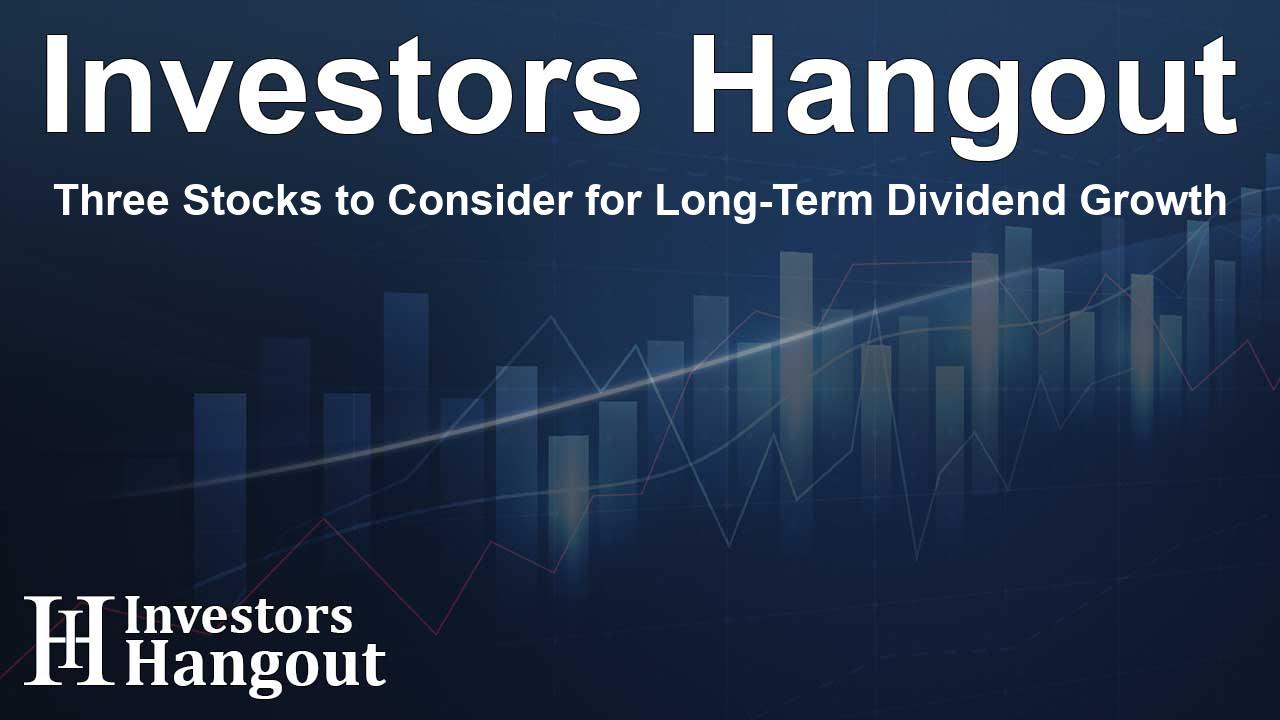Three Stocks to Consider for Long-Term Dividend Growth

Understanding Dividend Growth Stocks
When considering an investment in stocks, the dividend yield is a critical factor for many investors. However, focusing solely on high-yield stocks can lead to missing out on exceptional opportunities. Stocks that show a capacity for consistent dividend growth may offer robust long-term potential, sometimes even more than higher-yielding stocks. Thus, a deeper analysis of stock performance is vital in crafting a well-rounded investment strategy.
The Importance of Payout Growth
Investing in stocks known for rapidly increasing dividend payouts can often yield better returns than investing in established dividend providers with less aggressive payout strategies. For instance, companies that have increased their dividends substantially over the past decade demonstrate strong financial health and a commitment to returning value to shareholders.
Growth That Matters
Consider stocks like UnitedHealth Group (NYSE: UNH), Broadcom (NASDAQ: AVGO), and Dick's Sporting Goods (NYSE: DKS). These companies have markedly increased their dividends over the past ten years. A closer look will reveal why these stocks might be worthy additions to any dividend-focused portfolio.
1. UnitedHealth Group: A Leader in Dividend Growth
UnitedHealth Group stands out as an impressive dividend growth stock due to its innovative strategies in expanding healthcare coverage and services. The company's emphasis on data analytics and non-traditional care options positions it to seize new market opportunities within a growing industry.
The current quarterly dividend per share paid by UnitedHealth is $2.10, yielding 1.4%, which surpasses the S&P 500's average dividend yield. Historically, UnitedHealth has shown remarkable growth; its quarterly dividend has soared from $0.375 a decade ago to its current rate, marking a staggering 460% increase over the past ten years. This translates to an average compound annual growth rate (CAGR) of 18.8%, making it a compelling choice for dividend investors.
2. Broadcom: A Dividend Powerhouse
Broadcom is not only a leader in the semiconductor industry but also a robust option for investors interested in dividends. With its focus on artificial intelligence and networking technologies, Broadcom has positioned itself favorably for future growth.
The company currently pays a quarterly dividend of $0.53, with a yield of 1.36%. The journey of Broadcom’s dividends has been remarkable, escalating from $0.32 per share in 2014. When adjusted for a recent stock split, this means that its dividend has skyrocketed by over 1,556%, averaging a CAGR of 32.4%. This growth reinforces Broadcom's reputation as a strong player for both dividend and growth investors.
3. Dick's Sporting Goods: A Retail Growth Story
Dick’s Sporting Goods holds the title for the highest yield among the stocks discussed here, offering a dividend yield of 2%. The company's commitment to its core business of providing quality sports and fitness equipment positions it for steady growth in an evolving retail landscape.
The recent performance of Dick's has been noteworthy, prompting management to revise sales growth projections upward. The strong financial fundamentals are matched by a remarkable dividend increase from $0.125 to $1.10 per share over the last decade—an impressive growth rate of 780%, corresponding to a CAGR of 24.3%. With its solid business model, Dick's Sporting Goods remains a reliable income stock for the long term.
Should You Invest in These Dividend Stars?
If you're considering investing in dividend growth stocks, evaluating each company's long-term potential for growth and sustainability is key. UnitedHealth Group, Broadcom, and Dick's Sporting Goods are all strong contenders in this realm, offering noteworthy dividends and growth prospects that could benefit your portfolio.
Frequently Asked Questions
What is a dividend yield?
A dividend yield represents the dividend income relative to the stock price, providing insights into the potential returns from an investment in dividends alone.
Why should I consider dividend growth stocks?
Dividend growth stocks can outperform high-yield stocks by increasing returns over time, indicating stable financial health and strong management prioritizing shareholder value.
How do I choose the best dividend stocks?
Look for companies with a consistent history of increasing dividends, low payout ratios, and strong fundamentals to support future growth.
What are the benefits of reinvesting dividends?
Reinvesting dividends can compound returns over time, allowing investors to purchase more shares and increase future dividend payouts without additional investment.
Are dividends guaranteed?
No, dividends are not guaranteed. They are subject to the discretion of the company's board of directors and can be cut or suspended based on financial performance.
About Investors Hangout
Investors Hangout is a leading online stock forum for financial discussion and learning, offering a wide range of free tools and resources. It draws in traders of all levels, who exchange market knowledge, investigate trading tactics, and keep an eye on industry developments in real time. Featuring financial articles, stock message boards, quotes, charts, company profiles, and live news updates. Through cooperative learning and a wealth of informational resources, it helps users from novices creating their first portfolios to experts honing their techniques. Join Investors Hangout today: https://investorshangout.com/
Disclaimer: The content of this article is solely for general informational purposes only; it does not represent legal, financial, or investment advice. Investors Hangout does not offer financial advice; the author is not a licensed financial advisor. Consult a qualified advisor before making any financial or investment decisions based on this article. The author's interpretation of publicly available data shapes the opinions presented here; as a result, they should not be taken as advice to purchase, sell, or hold any securities mentioned or any other investments. The author does not guarantee the accuracy, completeness, or timeliness of any material, providing it "as is." Information and market conditions may change; past performance is not indicative of future outcomes. If any of the material offered here is inaccurate, please contact us for corrections.